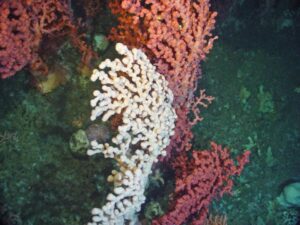New marine refuge in Nova Scotia to protect vulnerable deep-sea ecosystems
June 9, 2022 , K’JIPUKTUK/HALIFAX – The Nova Scotia Chapter of the Canadian Parks and Wilderness Society (CPAWS-NS) welcomes the creation of Eastern Canyons Marine Refuge off the coast of Nova Scotia. This new marine conservation area is 43,976 km² in size and will help protect vulnerable deep-sea ecosystems.
“Eastern Canyons Marine Refuge will protect cold-water corals and sponges, bottlenose whales, and a large area of deep-sea habitat,” says Reanne Harvey, Conservation Campaigner at CPAWS-NS. “It provides an important addition to the network of conservation areas protecting these sensitive species and habitats.”
The site will prohibit all commercial bottom-contact fisheries, with the exception of a small management zone for longline gear. This will help to protect slow-growing fragile corals that provide important habitat for fish and other marine life.

The area protected includes the only known living Lophelia pertusa coral reef in Canada’s Atlantic waters. These reefs are known to be hotspots for biodiversity.
Eastern Canyons Marine Refuge was first identified in 2018 through the conservation network planning process for the Scotian Shelf – Bay of Fundy bioregion. Negotiations have been underway over the past few years to finalize the conservation designation.
CPAWS-NS would like to acknowledge the important work undertaken by government, Indigenous communities, the fishing industry, conservation organizations, and academics.
“The official establishment of Eastern Canyons Marine Refuge is an important milestone for achieving marine conservation targets in Maritimes Region,” says Chris Miller, Executive Director for CPAWS-NS. “It’s a big step in the right direction for the full implementation of the Marine Protected Area Network Design”.
Canada has agreed to protect 25% of the ocean by 2025, and 30% by 2030. The establishment of Eastern Canyons Marine Refuge alone increases protection in Canada by almost 1%.
-30-
More information on the Eastern Canyons Marine Refuge can be found on the Department of Fisheries and Oceans website.
Photo credit: Fisheries and Oceans Canada
